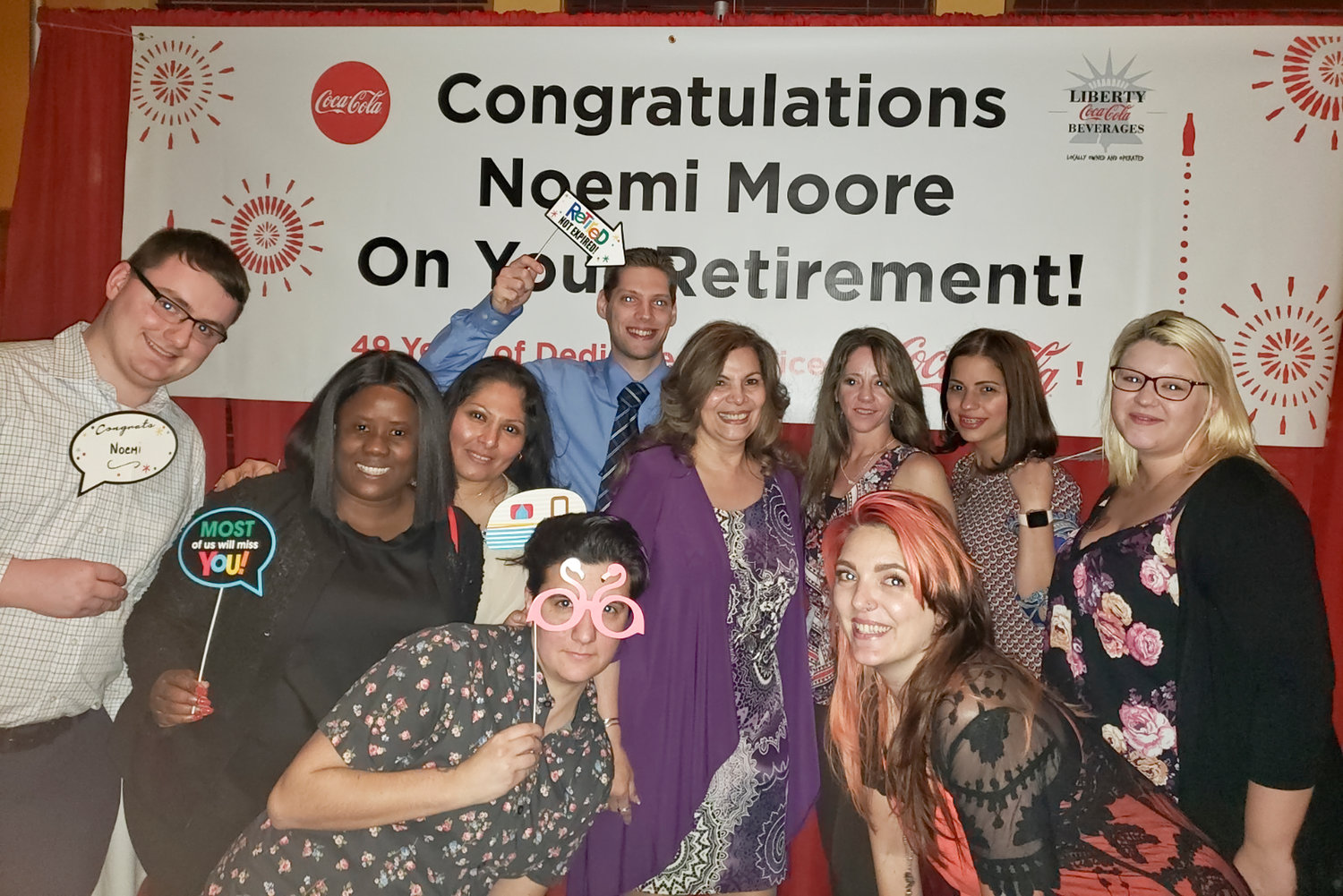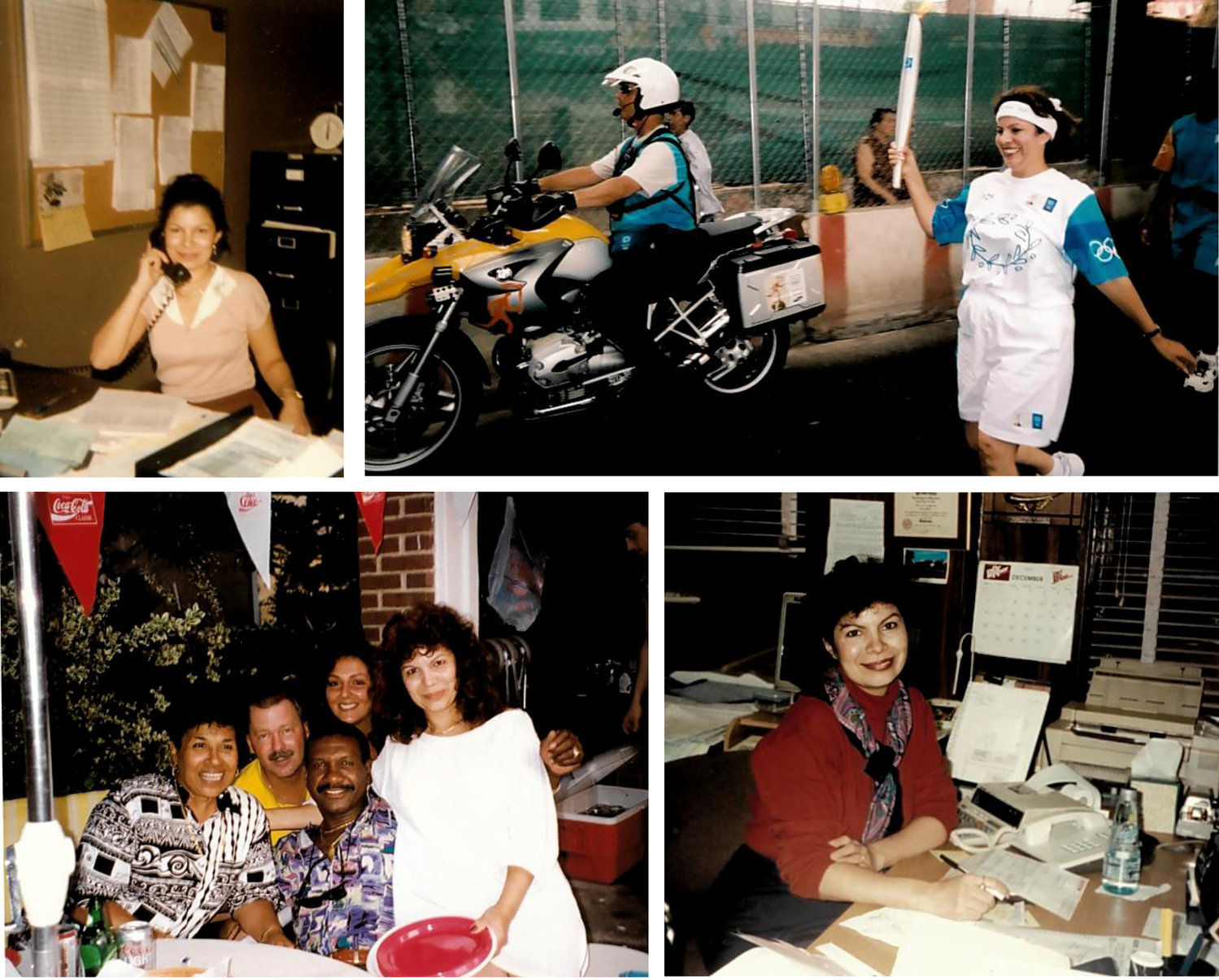Valley Streamer retires from Coca-Cola after 49 years
Posted

Noemi Moore, center, with her co-workers and team celebrating her retirement after nearly 50 years at Coca-Cola.
Courtesy Noemi Moore
In the fall of 1970, Valley Streamer Noemi Moore was 18 and living in Brooklyn with a 2-month-old daughter named Sonia.
Having dropping out of W.H. Maxwell Career & Technical Education High School, and without a car or driver’s license, she hit the pavement.
She needed a job.
It didn’t take long. After going door to door for a few blocks, she walked into the now-shuttered Coca-Cola bottling and distribution facility on Lyndon Boulevard and asked a manager for work.
He directed her upstairs, where she learned that there was an opening for a switchboard operator, which she interviewed for that day. “When can you start?” Moore recalled the office manager, Bob Freedman, asking her.
It began with a 555 cord PBX switchboard, a machine that required her to route all incoming and outgoing calls at the facility using short, copper-wire cords.
Within six months, Moore was promoted to another position at the office, in which she and six others input sales data using IBM keypunch machines.
The devices would punch holes into stiff paper cards — the equivalent of modern disks or USB drives — which were later fed into a computer, imprinting information that Moore and her team gathered from company invoices, so Coca-Cola had records of how much money it was making and how much product was selling.
Around this time, in 1973, Moore had her second child, a son named Efrain.
In 1976, she was promoted again, this time to assistant office manager. The transition was difficult, she recalled, because although her responsibilities were largely the same, she was now overseeing her former co-workers. Eventually, she said, “Everyone acclimated to the change and accepted me as their supervisor.”
In 1979, Freedman, now a regional office manager, approached Moore about an office manager’s position opening at Coca-Cola’s facility in Greenpoint, Brooklyn. It was the equivalent of the position he held when he hired her.
“I’m not ready,” she recalled telling him, to which he replied, “What do you mean, you’re not ready?”
He explained that assistant managers were essentially managers in training. “Go home and think about it,” Freedman told her. “. . . I think you’re just scared, but I think you’re ready.”
The next day, Moore came in and took the job.
The office was a bit smaller than the one she was used to. Her team consisted of five office administrators, but her responsibilities were expanded. She was now in charge of hiring and training the team as well as overseeing the finances of the entire facility — all on top of supporting two young children while going through a divorce.
In 1982, Moore was moved again, this time to a Coca-Cola facility in Jericho. It was a small step up, to a slightly larger plant. She also remarried that year.
In 1983 the newlyweds bought a house in Valley Stream, near Hendrickson Park, where Moore still lives. Her children attended Memorial, Central High School and Wheeler.
Hardship and tough decisions
Three years into her tenure as office manager of the Coca-Cola plant in Jericho, in 1984, Moore took a six-week leave to give birth to her third child, Edward. But it quickly became apparent that those six weeks would have to be extended indefinitely. Edward was born with a serious illness, and Moore learned that he would suffer from severe mental disabilities for the rest of his life.
“I was devastated,” she said, and although she wanted to continue working, after pressure from her family, she submitted a letter of resignation to Coca-Cola. “I felt at the time I needed to see what I could do for my son.”
But after nearly two years out of work, Moore recalled, she was becoming depressed and needed to return.
Her second husband, who also worked at Coca-Cola, began asking around, and in 1986, Mike Harford Sr., a senior vice president at the company, reached out. He needed an executive assistant.
Moore returned to the Jericho facility, where she served under Harford and the company’s regional controller, Bruce Gaugler. Her responsibilities were different now, and involved producing memos and financial reports. While she adapted, there was one problem — she didn’t know how to type.
Moore decided to go to college. She attended Briarcliff College in Hicksville and Lynbrook, taking night classes, initially in typing. After discovering her love for school, she went further and obtained an associate’s degree in business in 1991.
Around the same time, her eldest child, Sonia, was also attending college. “I grew up with my daughter,” Moore joked. Sonia became a successful accountant.
Gaugler served as a mentor for Moore while she worked as his assistant, she recalled, teaching her advanced accounting, and how to produce forecasts and budgets, calculate accruals and produce spreadsheets in LOTUS, now that the offices were computerized. The skills would come in handy for her later.
She served in the position for about a year until she was made an assistant office manager again. In 1989 she was promoted once more to office manager at her old Brooklyn plant.
In 1990, Coca-Cola consolidated its facilities in the region into one huge distribution center in Smithtown, and Moore transferred there. She was promoted to financial analyst, leveraging the skills she earned in college and under Gaugler, who again became her boss.
She loved the job. “I’m a numbers person,” she said. “I love being an accountant.”
In 1995 Moore was made the regional accountant for New York and New Jersey, and she still keeps the memo of the announcement as a reminder. “I always say I have a doctorate in the Coca-Cola world,” she joked.
Anxiety and stability
Despite Moore’s rise through the company, in 1997 her regional Coca-Cola franchise was sold to Coca-Cola Enterprises and her position was eliminated. It was a frightening development for her, she said, and came as she was going through her second divorce.
But a former employee, then a regional office manager for Coca-Cola Enterprises, noticed a listing for Moore’s severance package buried in her paperwork, and reached out with a job offer. “We had known each other for many, many years,” Moore recounted. “We had gone to each other’s weddings.”
Moore became a business manager — and, despite more buyouts, it was the position she will hold until her full retirement this June. Her team of eight handles all the finances, paperwork, charity and community engagement efforts for the Smithtown facility.
Additionally, she was recommended by a facility manager to carry the torch at the 2004 Summer Olympics in Athens, in recognition of her work with the company while supporting her son Edward.
“What strikes me the most about Noemi is she’s one of the most passionate and dedicated people to not only the company but the folks that work for her as well as her family,” said General Manager Frank Palma, who worked under Moore as an entry-level account manager in 1998.
He recalled struggling to compile his year-end inventory, quickly running up against his deadline on New Year’s Eve, when Moore agreed to help him finish the work. “We actually celebrated the ball dropping together by clinking two glass Coca-Cola bottles together,” Palma said.
Five decades, five computer systems, four buyouts and countless co-workers’ weddings later, Coca-Cola threw a send-off party for Moore on May 7.
“I loved the people,” she said. “I think that was the key of why I stayed so many years. I loved the company. I tell people that the company is part of me.”
Report an inappropriate comment
Comments

 48.0°,
Overcast
48.0°,
Overcast 




